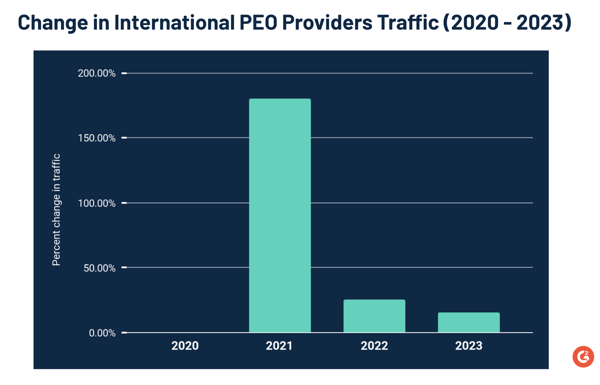Imagine the perfect candidate. They’re smart, learn fast, and can grow within your organization.
The only complication is they live in a different country than your business. What do you do?
Global hiring, or international hiring, provides new employment opportunities for organizations to hire outside of the countries they live in. While remote technology makes this possible, it can be a complex legal issue between setting up shop in a new country, taking on the liability, and maintaining compliance.
That’s the problem our new Employer of Record (EOR) and Global Employment Platforms (GEP) categories seek to solve.
In this article, we’ll walk through how these solutions work and allow organizations to hire outside their immediate circle.
How technology revolutionized global hiring
In the past few decades, the industry has seen a change.
Earlier, most international hiring agencies relied on phone, email, and snail mail. However, even longtime legacy platforms have recently stepped up to offer more software-centric solutions. That change is shown in more responsible, robust platforms that help with overseas hiring.
While the EOR and GEP categories are new to G2, one international hiring software category has been around for a while—International PEO Services. Though it’s a services category, it still indicates a clear interest in global hiring.

Bearing in mind that it’s currently only July of 2023, there’s been a steady uptick year over year with category traffic that shows that international PEO isn’t going anywhere soon.
Users are looking at these categories because they have a problem that needs to be solved.
How do EOR and GEP software solve global hiring problems?
What is an employer of record (EOR)?
EOR is a legal arrangement where the software company technically employs the person and takes on all the legal risks.
However, the company that uses the EOR is still in charge of hiring, onboarding, and developing the employee. They simply have an intermediary owner.
Again, this is advantageous because employers don’t have to worry about taxes, compliance, or other risks. Despite that, EOR providers offer a whole host of global employment solutions such as international payroll, benefits, and others.
The category was launched in May 2023, and the current category Leaders on the G2 Grid® include Remote, Deel, and Rippling.

What are global employment platforms (GEP)?
While EOR software uses the specific legal EOR arrangement, GEP covers a more comprehensive range of solutions that may use any number of legal arrangements.
Some have a co-ownership arrangement with a professional employment organization (PEO) where both companies co-employ the worker.
What sets GEP apart from other similar solutions and services is a strong, software-centric model and greater reliance on modern technology.
Launched in April of 2023, the current category Leaders on the G2 Grid® include Remote and Oyster.
Global hiring will continue to rise in 2024 and beyond
Between the skills gap, the shaky world economy, and a growing need for more talented people in the right positions, international hiring will continue to increase. There’s too big of a need for many organizations.
However, as with all trends, companies will eventually find an equilibrium between remote and onsite workers.
The two new categories on G2 present buyers with a way to explore different providers, weigh options, and decide on the best way forward with the most valuable asset: workers.
The hiring domain is all about people. Learn how you can navigate the ethical implications of generative AI in the HR world.
Edited by Jigmee Bhutia


 by Grace Savides
by Grace Savides
 by Grace Savides
by Grace Savides
 by Grace Savides
by Grace Savides